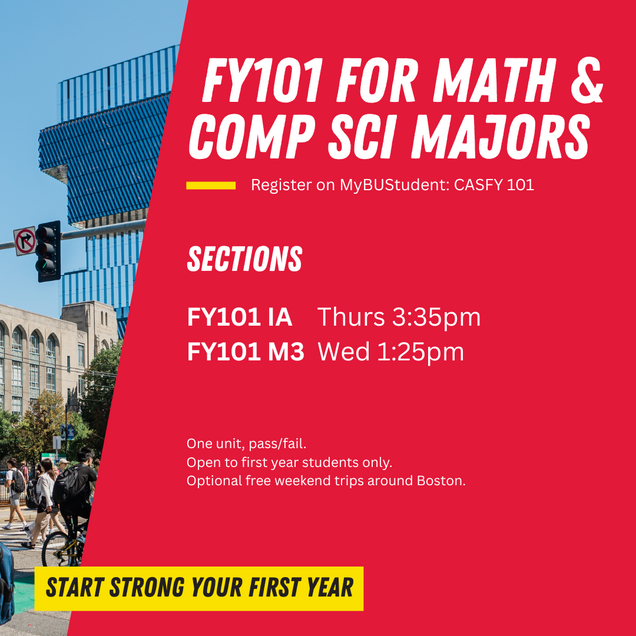Registration Guide: Computer Science
Students majoring in Computer Science will ordinarily, through coursework in the major, satisfy BU Hub requirements in Quantitative Reasoning, as well as some requirements in Communication and the Intellectual Toolkit. Remaining BU Hub requirements will be satisfied by selecting from a wide range of available courses outside the major or, in some cases, cocurricular experiences.
A typical first semester Computer Science major schedule looks like:
- Computer Science course
- Calculus or Computer Science course
- Language course or Course of interest
- Writing course
- Optional add-on: First-Year Seminar
Please review the drop-down items for more detailed explanations:
Your first course will likely be CAS CS 111 Introduction to Computer Science 1. This course is a rigorous introduction to the CS major that develops computational problem-solving skills by programming in the Python language, and exposes students to variety of other topics from computer science and its applications. If you have AP, IB or other advanced credit for CS 111, you should instead take CS 112 Introduction to Computer Science 2. CS 112 covers advanced programming techniques and data structures. Topics include recursion, algorithm analysis, linked lists, stacks, queues, trees, graphs, tables, searching, and sorting. **If you have advanced credit for both CS 111 and CS 112, please move to Course #2, as you may want to take both courses listed there.Course #1: Computer Science Course
Calculus Course: Your second course should be CAS MA 123 Calculus 1. While this is not technically a requirement for Computer Science majors, this is a critical and foundational course to prepare you for future major coursework. You are strongly urged to take Calculus 1 in your first semester at BU. -OR- Computer Science Course: If you have AP, IB or other advanced credit for CAS MA 123, you can instead take CAS CS 131 Combinatoric Structures.Course #2: Calculus 1 or Computer Science Course
CAS Language Course: CAS students must exhibit proficiency through the fourth-semester level of a language other than English. If you have not already done so, please review the full language policy here. If you plan to fulfill this language requirement through coursework at BU, then your next course should be a language course: If you’ll fulfill the language requirement through advanced credit (such as AP/IB scores) or through native proficiency of another language, you have fulfilled your language requirement and can instead take a course of interest (as seen below). -OR- Course of Interest: Select a course that interests you – perhaps based on subjects you’ve enjoyed in the past or a new subject you’re excited to try for the first time! If you’re not sure where to start, you can review our Registration Instructions for tips on browsing by topic or Hub requirement.Course #3: Language Course or Course of Interest
Your fourth course should be a writing course: First-Year Seminar: FY 101 (1 unit) – Optional FY101 is a one-unit, low stress, non-academic class that serves as a semester-long introduction to BU and college life. FY101 helps you get a head start on making connections at BU. Each section is taught by a student peer mentor and a staff instructor. -OR- First-Year Career Development Seminar: FY 102 (offered spring only, 1 unit) – Optional FY102 will help first-year students get started on utilizing the Career Development Cycle to maximize their time at BU. During this course, students will create a plan of action towards choosing a major, creating a resume, finding an internship, and preparing for a career they will love. Seminars are offered in various fields of interest and include guest speakers from different industries. If you are interested in the Core Curriculum, we recommend one of the following courses in place of a language course/course of interest. (Talk to your advisor to discuss these adjustments in more detail!) If you are interested in the humanities-based Core courses, we encourage you to consider CAS CC 101 (see the ‘Writing Course’ drop-down above). **PLEASE NOTE: Students in the Core Program who are interested in majors within the natural sciences (Astronomy, Biology, Chemistry, Earth & Environmental Sciences, Neuroscience, Physics, etc.) and are taking at least one laboratory course this semester should NOT enroll in CAS CC 111 or 212. Find out more about the Core Curriculum, the Hub, and registration here. Ready to register? Let’s go – click here! For more information about your specific major requirements click here!Course #4: Writing Course
Optional Course #5: First-Year Seminar

Interested in Pursuing the Core?